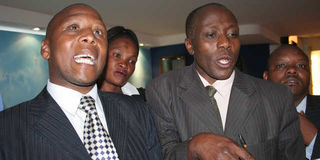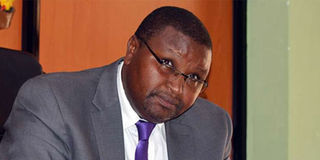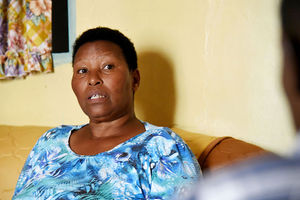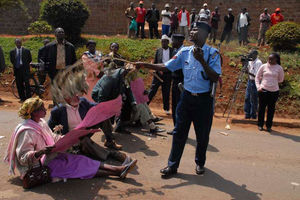
National Pyramid Scheme Victims Initiative chairman Pastor Samuel Kariuki (right) and CEO Joseph Kinyua narrate their plight at Nation Centre on February 24 2009
Between 2005 and 2007, as the country was gripped by a constitutional referendum and General Election campaigns, at least 39,000 Kenyans were silently conned out of more than Sh34 billion in Ponzi-like schemes.
Thousands of gullible Kenyans were lured by some 366 get-rich-quick schemes that promised handsome returns on financial investments.
It later emerged that some of the Sh34 billion collected dubiously was used to fund the 2007 General Election campaigns for some politicians.
For close to two decades now, those who bought into the overnight riches craze have never recouped the money, and there are no signs of recovery.
Instead, they have been suffering a streak of losses, the latest being last week's foiled bid to secure Sh248 million allegedly held in an account of one of the investment schemes.
The nationwide financial scam started with the registration of 366 pyramid schemes, which opened accounts in various banks.
Recruitment of investors followed. Religious and community leaders were enrolled as the main recruitment agents for a bigger outreach, and to cultivate trust in the investment schemes.
Court filings show that bank accounts operated by the pyramid schemes had numerous deposits by the investors and withdrawals by directors of the entities.
In the case of an entity known as Pavera, for instance, investors were promised returns of up to 25 per cent interest — an irresistible reward.
A majority of the bank accounts were later closed with nil balances, meaning that even if the government were to freeze them, there was no money.
The schemes were styled as limited liability companies, trusts, sole partnerships, businesses, welfare associations, Non-Governmental Organisations (NGOs), foundations, ventures, investments, micro-finance groups and Savings and Credit Societies (saccos). They were issued with requisite business licences, certificates of incorporation on registration and registration certificates.
Armed with these registrations from State regulatory agencies, the operators of the fraud schemes opened bank accounts under false pretences of paying high returns on deposits made with them.
The statutory registration and licensing enabled the entities to make false representations to the investors that they were viable business concerns.
They approached gullible investors who were misled into depositing various sums of money into the outfits’ accounts. None of the people who fell victim paid the money to an individual, as all transactions were done through banks.
According to court papers, the fraud continued uninterrupted for two years because any attempts by the government to intervene were met with acrimony from the investors. The investors accused the State of “interfering with their investment activities”.
The fraudsters later vanished, and the victims turned around and said that the shadowy business could not have happened for two years without the knowledge of the government.
If the 39,000 victims were to share out the Sh34 billion equally, it would mean each lost an average of Sh871,790.
Swept under the carpet
The scandal surfaced in 2009 and was too big to be swept under the carpet, prompting the then Minister of Cooperatives Development and Marketing, Joseph Nyaga, to order investigations.
Consequences of the swindling have been far-reaching; emotional distress, families and livelihoods were ruined, feelings of betrayal, and more than 20 victims committed suicide due to depression.

Former Cooperatives minister Joseph Nyaga.
"Since the money was lost in 2006/7 the petitioners and their families have suffered loss of savings, capital and interest and their lives have been a basketful of tears and misery. The nationwide financial scam was clearly foreseeable," they told the court in a petition filed in 2015.
“The scam generated stress and strife in the victims' families, left children without provisions and school fees and parents without resources to improve themselves and sometimes buy medicine, leading to poverty and destitution, acrimony, insanity, suicides and deaths.”
Some reports stated that over Sh34 billion went through the banking system to the accounts of the investment schemes during the peak of the fraud.
Desperate for the recovery of the lost cash, the victims formed and registered an association, National Pyramid Scheme Victims Initiative (NPSVI), to fight for justice and compensation.
The thinking within the association is that the scam was a government-enabled fraud, as the entities were legally registered and licensed even though they had no legitimate business to do.
They say that they were fleeced and suffered serious financial losses under the watch of the government and its agencies tasked to oversee, control and manage the banking sector.
However, hopes to recover the cash have increasingly been dashed after the government abandoned the victims and denied liability or accountability.
In court, they have been defeated numerous times, making the long search for justice futile.
They lost the compensation bid in February 2021 after Justice James Makau dismissed their case, stating that the petition was an abuse of the court process and an attempt to pressure the government to burden the taxpayer and pay victims money lost to the pyramid scheme entities.

Justice James Makau.
The court found that the victims were accomplices in their own problems since they rejected the government's intervention as they viewed the same as “an interference to their smart investments”.
They were also slapped with costs of the seven-year litigation (2015 to 2021).
Those who were conned out of their money were required to pay the respondents, including the Attorney General, Principal Secretary, Ministry of Cooperatives, Governor of the Central Bank of Kenya, Principal Secretary, Ministry of Finance and the Ministry of Internal Security, the legal fees and costs incurred in the lengthy court dispute.
A recent attempt to have the 2021 judgment reviewed suffered a blow last week after Justice Chacha Mwita threw out the application.
Sh248 million
In the renewed recovery attempt, the victims also wanted a refund of Sh248 million, which was allegedly admitted by the government as having been impounded by the Central Bank of Kenya (CBK), being money belonging to the victims.
Their lawyer, Wanyiri Kihoro, pointed out that it had been admitted that money belonging to victims of pyramid schemes had been remitted to the CBK. He added that a report had been filed showing that properties worth Sh387 million were purchased using the victims’ money.
Mr Kihoro also took issue with the order that victims pay the costs of the petition when the respondents did not pray for costs.
But the court declined to exercise its review powers on the judgment, with Justice Mwita ruling that there was no error apparent on the face of the record to be corrected.

Justice Chacha Mwita.
He added that there was no evidence that money was remitted to the CBK or that there was money in the pyramid accounts.
"The petitioners essentially complain that the court did not order a refund of the money, which the petitioners argue was their money paid to the pyramid Scheme and taken by the CBK. It is plain, according to the excerpts from the judgment, that the court considered the issues raised in the petition with regard to funds and whether such funds were remitted to the CBK. The court concluded that there was no evidence first, that there was money in the pyramid accounts, or second, that money was remitted to the CBK," said the judge.
Dismissing the application, he ruled that even though there were wrong conclusions in the judgment on fact and law, that cannot be the basis for the court to exercise review powers.
Regarding costs, the judge said any grievance over costs can only be a ground of appeal.
The litigation started in March 2015 with the victims holding that the government—the Attorney General, Ministry of Cooperatives Development (saccos), Ministry of Finance, CBK and Office of the President Ministry of Internal Security — neglected their duty of care to Kenyans.
"There would have been no defrauding of the petitioners without the Attorney-General and Ministry of Cooperatives Development providing a total 366 instruments of fraud used by the outfits, which were registered. The entities were in operation, but none of them exist today. There were different extents of involvement and participation in the fraud by the entities," said the petitioners.
They had filed bulky evidence in court, but the court expunged the Petitioners' Books Volume No. 6B & 8), leaving the case to proceed on the basis of evidence and documents contained in Book One and Three.
Since the victims are from 45 of the 47 counties, they believe this in itself confirms that the national operation of the outfits was not possible without the legitimisation by the government.
The investment schemes could access public, commercial and governmental infrastructure, institutions, opportunities and certifications.
The fraudulent financial operation ended following an order by the CBK directed at the banks and other financial institutions that the accounts operated by the schemes be closed.
Without this intervention, the outfits, being legally registered, could have continued with their fraudulent business to date.
"It is impossible to believe all this happened in under two years between 2006/7 without the knowledge of the CBK. The Nyenze-led parliamentary report cites certain accounts where the petitioners’ money was held, and wonders why it could not be refunded to them immediately after it was rounded up and what has it been waiting for when there was no court order to sequester the funds," reads the court papers.
But the government said that it did not do anything that enabled the said entities to make false representations to Kenyans that they were viable business concerns.
"The registration of any business upon application is a legitimate expectation of any entrepreneurship-minded citizen in Kenya. As such, no person could have been denied registration under their preferred legal regime," asserted the government's advocates.
For its part, the CBK said it could not and did not hold any regulatory mandate over the entities that conned Kenyans, nor did it owe any duty of care under the statute or common law.
"The law on the duty of care is that public authorities, like private individuals and bodies, generally owe no duty of care towards individuals to prevent them from being harmed by the conduct of a third party," said CBK's representative, Kennedy Abuga.
"It is uncontested that any attempts to intervene were met with acrimony from the investors, who viewed government involvement as interference with their investment activities. Petitioners can only have themselves to blame for the risks they took in making their investments with the pyramid scheme-style entities," he added in the court filings.
The court sided with the Government upon finding that CBK had issued public notices cautioning Kenyans against dealing with unlicensed microfinance institutions.
"The May 25, 2007, press notice by the Governor CBK advised members of the public that pyramid schemes were fraud, and urged the public to avoid putting their money in such schemes. The notice further called upon commercial banks and financial institutions, which fall under the Central Bank of Kenya’s regulatory mandate, to urgently conduct due diligence on accounts exhibiting characteristics of pyramid schemes in accordance with “Know Your Customer (KYC)” guidelines," said the court.
The notice was also circulated through the electronic media to increase its outreach. It further advised members of the public with complaints relating to fraud by such schemes or evidence that persons or organizations in that business were soliciting deposits from the public to contact the Director Banking Fraud Investigations Department.
Given the attitude adopted by the victims against the Government, the court said, "It is trite law that claims that public authorities may owe an individual involved in criminal behaviour a duty of care, have been barred".










